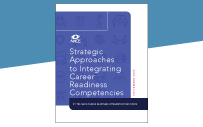
To compete in the job market, students must be able to connect their experiences to skills and communicate that to potential employers. Infusing skill development across campus can achieve that. Jill Donovan, Brookdale Community College, discusses how her career center began the process of integrating career readiness campus-wide.

By measuring employment brand strength, companies can identify areas to improve their employer brand, pinpoint strengths to leverage, and assess the effectiveness of their recruitment strategies, ultimately aiming to attract the best candidates and reduce hiring costs.

Because faculty are frequently asked by their current and former students for career advice, there is an opportunity to increase awareness among faculty of the resources available to them.

The NACE Career Readiness Competencies can be a valuable tool to help faculty members demonstrate to administrators, students, and parents that what they do creates long-term value for students.

Faculty are a key source of career advice for students—with more than nine of out 10 saying students asked them for guidance in the past year, according to a new study conducted by NACE in collaboration with the American Association of Colleges & Universities and the Society for Experiential Education.

Strategic Approaches to Integrating Career Readiness Competencies, developed by the NACE Career Integration Task Force, identifies strategies and practices for integrating career readiness skills and competencies institution-wide and examines how career readiness informs skills-based hiring. The publication also identifies further areas for research.

As October is National Disability Employment Awareness Month, several organization offer resources about disability inclusion for employers and career services offices to use now and throughout the year.

CUNY SPS recognized that certain curricula could better communicate to students how their courses address career competencies and the significance of the competencies in achieving career success.

The University of Redlands’ Career Faculty Fellows Program was launched in 2019 to help the institution scale career services and embed career preparedness more intentionally into the curriculum.

When it comes to the development of college students’ career readiness, industry should be complementary to and support career services professionals and faculty, explain Liz Moran and Lynn Letukas of SAS.

New to the repository is “Curated Resources for Teaching and Assessing Career Readiness Competencies,” a compendium developed through a grassroots effort by NACE members. Access this and other resources at www.naceweb.org/career-readiness/resources/ .

The effective preparation of college students for careers is an important college outcome. Yet, employers and the public increasingly feel that universities are not doing enough to prepare students for the workforce

It seems like you don’t have to look far to find criticism regarding the value of a college degree. In fact, some critics (and graduates who are riddled with heavy student loan debt) are recommending a harkening back to vocationally focused education

At the University of South Carolina, career services is working to make career readiness and employability everyone’s responsibility with its career champions program.

Richmond merged career services and alumni services to elevate career services, provide additional resources for students, and more deeply engage alumni.

The guide provides faculty with information about the ethical and legal implications associated with referring students for internship and employment opportunities.

This case study by the NACE Principles for Ethical Professional Practice Committee addresses the ethical issues involved when faculty refer and rank students for employers and offers recommendations for how career center staff can resolve the issues.

A cross-functional team led by faculty integrated career readiness into the College of Liberal Arts at University of Minnesota-Twin Cities.

The Stony Brook Center for Remote Internships & Experiential Learning provides practical resources for employers operating remotely during the pandemic and beyond.

Having a formal policy helps the team in the University of Oregon’s career center team with consistency when considering postings from employers seeking unpaid interns.

Solo or small-staff career services offices can take steps to sustain a satisfactory level of career services and, in some cases, grow their operations.

The New College of Florida’s SMAH Internship Program has a twist in its approach that distinguishes it from other programs that fund students’ unpaid internships.

To understand faculty activity and attitudes about preparing students for post-degree employment, the authors surveyed faculty and found that are willing allies.

The UNO Campus Career Council supports students in achieving their career ambitions through shared knowledge of best practices and industry training.

Searching for a job can itself be a full-time job and could lead to burnout. Giving students permission to rest and recharge can ease the mental burden and lead to future success.

One way to address career preparation is by ingraining it into the curriculum with the help of faculty champions.

Many career services professionals are asked to prescreen candidates for employers—to identify their “best” students. So, too, are faculty members. Beyond a host of ethical issues involved in such a request, there are legal implications.

Identify faculty partners willing to work collaboratively with the career services office in a partnership to promote student success, including reaching their personal, academic, and professional goals.